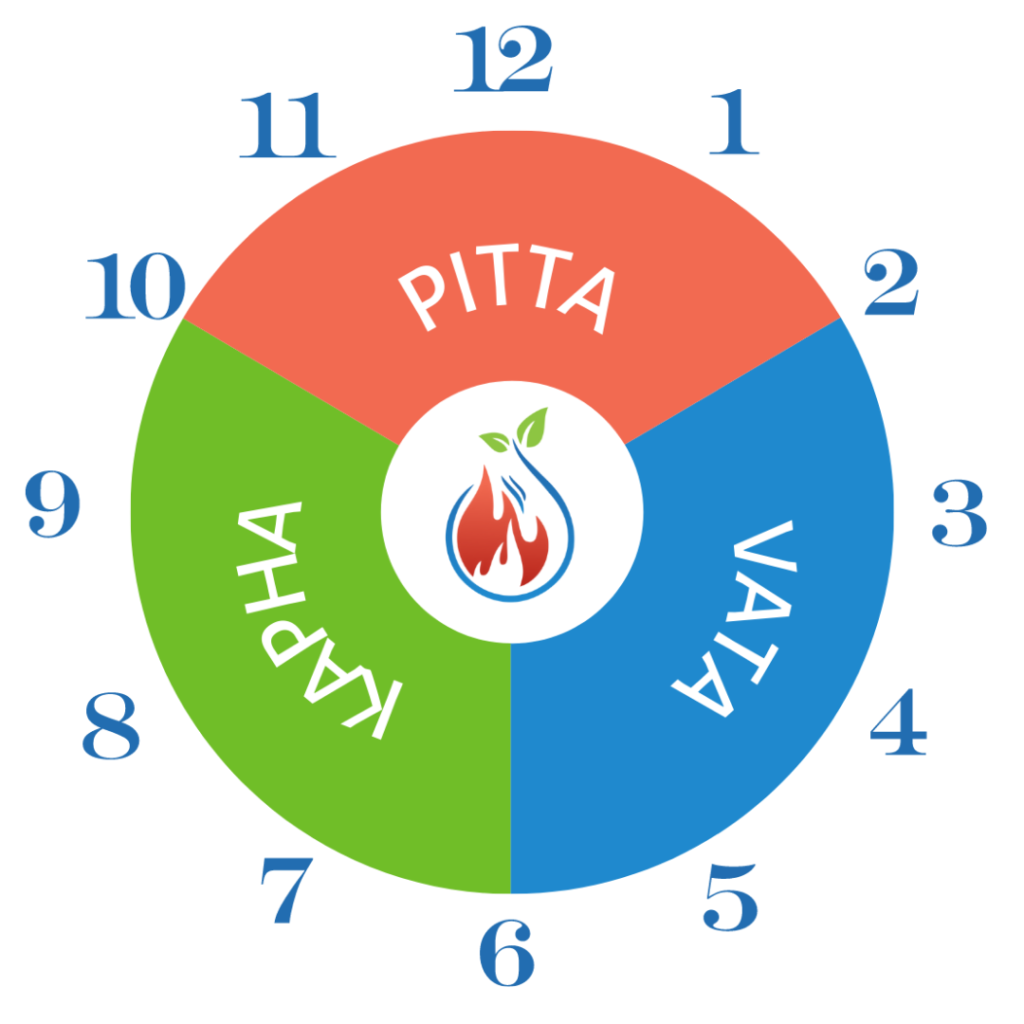Did you know that the time you eat can alter the way your body digests food? The Ayurvedic clock, a concept that Ayurvedic medicine incorporates, states that digestion is better when food is consumed at the optimal meal times. Following Ayurveda and digestion principles makes one feel lighter, healthier, and more energetic. In this blog, we will study the Ayurvedic clock, clock the Ayurvedic clock, its optimal meal timings, its role in digestion, scientific insights, and how one can integrate these ideas to improve daily life.

1. What Is the Ayurvedic Clock?
Following nature’s pace can help optimize daily activities, and it is called the Ayurvedic Clock. Here is what you have to learn:
- Ancient wisdom: Ayurveda, around 5,000 years old, suggests the body has a natural cycle that follows daily.
- Anatomy Cycles: The Ayurvedic clock splits daily into three primary energies or doshas: Vata, Pitta, and Kapha.
- Peak food intake: Fire energy or Pitta is imminent between 2 pm and 3 pm That means bland, digested food is thin, so it is the best time to eat.
- More obesity-related issues: Eating at the correct time according to Ayurvedic principles helps maintain balance and health.
- Ayurveda and Digestion: Specific instructions on doshas guide when to sleep, work, and even rest.
The Ayurvedic clock is an amazing guide to help one flourish while following nature’s cues. It helps one increase their efficiency by syncing meals with the body clock.
2. Best Timings for Meals
The Ayurvedic clock gives precise times for eating. Here are the Best meal timings to follow:
- Breakfast (7 am—8 am): During the Kapha energy phase, eat lightly because it is calm. So, have warm fruits or oatmeal for breakfast.
- Lunch (12 pm—2 pm): This is the Best meal time for the heaviest meal of the day. There is a Pitta energy peak, so digestion is most potent, perfect for heavier foods like rice, veggies, or pr—in.
- During dinner time, K’s energy returns. It’s best to eat a small light meal. Soups and salads are great, so you don’t overload your tummy before bed.
- No late snacks: Ayurvedic principles of diet and digestion state that meals should be avoided after 7 pm because the body needs to rest and digest steam overnight.
- Listen to the body: If hungry throughout the day or in between meals, light snacks such as nuts can be added, but moderation is the key.
According to Ayurveda, the Best meal timings encourage and make it easy for the body to digest food. It is all about eating when your stomach can work.
3. How It Impacts Digestion
The Ayurvedic clock has numerous ways to improve your digestion. Let’s discuss them.
- Hostname: Eating lunch at 12 pm and 2 pm is also an Ayurvedic digestion tip. It aligns with the Pitta dosha. Hence, following daily routines and healthy lifestyles shows peak body digestion during lunch.
- Less belly grass: Ayurveda and digestion books recommend skipping gassy heavy foods and moderate carb-heavy meals in the late evening or eating gas-creating foods at nighttime.
- More Active: Following the best meal timings will ensure your food does not make you lethargic all day and instead makes you feel like you are accomplishing a lot throughout the day.
- Sleep improvement: Sleeping with an empty stomach around 7 pm will ensure your belly does not bloat when you want to sleep for a better night out.
- Balanced system- Following the Ayurvedic clock will ensure you do not have good acid appetite problems or experience constipation too often.
You should stop forcing food into your tummy and let him relax with the proper eating schedule. This will give you more satisfaction every day you want to push your daily goal limits beyond what’s offered.
4. New Studies On Meal Timing
Is there any absurd Ayurveda and digestion? Time to dive into scientific resources:
- Divided Clocks: Science uses the divided body clock as a ‘circadian rhythm’ and uses 24-hour timing gauges to determine when the body can efficiently digest food and aid in pumping hunger.
- Midday peak. Research indicates that your digestion is strongest around noon, as the Ayurvedic clock recommends for lunch.
- Late eating risks- Supporting the concept of early dinners, research shows that eating late at night is associated with gaining weight, having poor sleep quality and experiencing stomach problems.
- Fasting benefits- Ayurveda’s notion of refraining from eating after 7 pm gives the gut a rest which allows healing.
- Energy flow- Eating at the best meal times harmonizes with your body’s natural surge and dip periods, bolstering the balance.
Modern science supports what Ayurveda has taught for centuries: timing your meals could improve your body’s functions.
5. Daily Routine Tips
You can easily incorporate the Ayurvedic clock into your lifestyle:
- Start your day right: Set your wake-up time at 6 am. Drink warm water mixed with lemon to start your day and have breakfast by 8 am to jumpstart digestion.
- Make lunch the main meal: According to the Best meal timings theory, have your largest feed timing between 1 p.m. and 2 pm. Make sure to include protein, grains, and veggies.
- Keep dinner light: Finish your day with a small serving of steamed veggies or soup by 7 pm to allow your body to rest without hard work.
- Avoid distractions: Ayurveda and digestion recommend eating without the TV/on the phone, as concentrating on your meal enhances your overall health and digestion.
- Add calming habits: Short walks or sitting in silence are great ways to aid the body in processing food after a meal.
- Sleep early: The body needs to rest by 10 pm for recovery. Resting the body relates to the Ayurvedic clock.
These suggestions, while simple, can be tremendously impactful. They aid the body in enhanced digestion, which contributes to feeling great throughout the day.
Conclusion
The Ayurvedic clock is a remarkable approach to enhance overall wellness if used correctly. Following the best meal timings, you can strengthen your digestion and reclaim lost energy. Ayurveda and digestion teach that food should be consumed when the body is prepared for a hearty lunch around noon. A light dinner at 7 pm Modern medicine supports the view that timing is essential for a healthy tummy. Experiencing balance with slight changes to the routine is possible in today’s world. These tips will help you feel lighter, happier and more nutritious when adopted.


